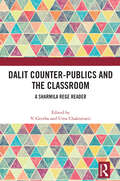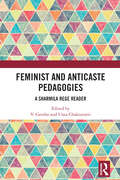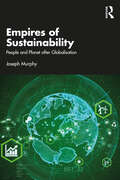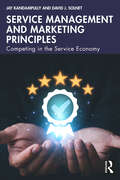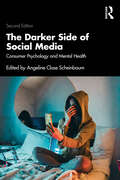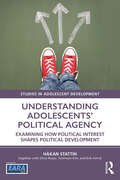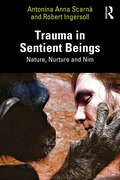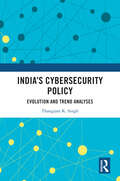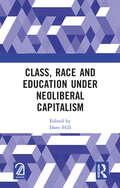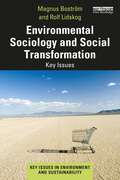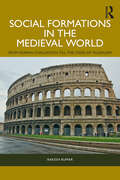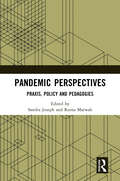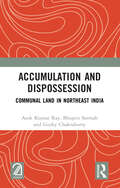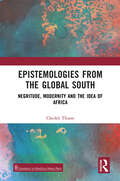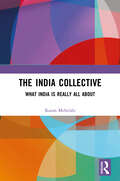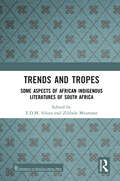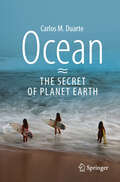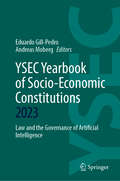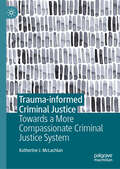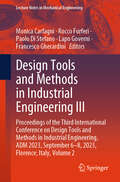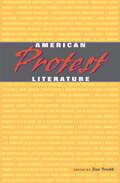- Table View
- List View
Dalit Counter-publics and the Classroom: A Sharmila Rege Reader
by Uma Chakravarti V. GeethaThis book is an anthology of the collected essays of Sharmila Rege (1964 – 2013) that addresses themes to do with pedagogy and culture. Rege makes a compelling argument for rethinking the content of sociological knowledge and invokes in this context, Anticaste radical philosophies, associated with Mahatma Phule and Babasaheb Ambedkar as well as the writings of Dalit women. Equally, she seeks to rethink and engender the domain of Cultural Studies. She calls attention to 'Dalit counter-publics', comprising performance and commemorative traditions that are committed to ending the caste order and argues for a critical rethinking of the relationship between caste, sexuality, and popular culture.Framed and annotated by an introduction that places Sharmila's work in the intellectual and historical contexts that shaped it, the volume also features short prefatory notes by her colleagues on the various themes taken up for discussion. Addressing, as it does, the researcher, the activist and the teacher, the book is indispensable for students and researchers of Women’s Studies, feminism, gender studies, Dalit Studies, minority studies, Sociology, Cultural Studies, Performance Studies, as well as studies in language and rhetoric.
Feminist and Anticaste Pedagogies: A Sharmila Rege Reader
by Uma Chakravarti V. GeethaThis book comprises the collected essays of Sharmila Rege (1964 – 2013), which span a range of themes, including critical perspectives on women’s movements, Dalit standpoint feminism, and the relationship between Women’s Studies and other disciplines. Written over two decades and more (from the 1990s to 2010), these pioneering essays draw from the struggles and writings of Dalit women, the long history of anticaste thought in Maharashtra and global feminist debates. Equally, they address enduring concerns to do with caste and gender, and call attention to the inseparability of struggles against caste and patriarchy.Framed and annotated by an introduction that places Sharmila's work in the intellectual and historical contexts that shaped it, the volume also features short prefatory notes by her colleagues on the various themes taken up for discussion. Addressing, as it does, the researcher, the activist and the teacher, the book is indispensable for students and researchers of women’s studies, feminism, gender studies, Dalit studies, minority studies, Sociology, as well as studies in language and rhetoric.
Emerging Digital Technologies and India’s Security Sector: AI, Blockchain, and Quantum Communications
by Pankaj K Jha Vedant Saigal Arun Teja PolcumpallyThis book is an introductory account for policy makers, academia, and interested readers on the digital technologies on Indian Military. It covers three technologies – AI, Blockchain, and Quantum communications – and provides a detailed account on the military use cases. It evaluates the readiness of Indian Military in these technologies. A foundational text, it not only provides key policy analysis but also identifies the gray areas for the future research in the security studies.The volume will be essential reading for scholars and researchers of military and strategic studies, especially future warfare, AI and Blockchain, and South Asian studies. It will be of interest to general readers as well.
Empires of Sustainability: People and Planet after Globalisation
by Joseph MurphyFocussing on the greening of imperialisms and empires, Empires of Sustainability analyses the shift around the world from denial of the environmental crisis to action to prevent catastrophe, and the resulting implications.Evidence of this shift is clear in widespread and purposeful social change which is gathering momentum. The book explains how globalisation accelerated us towards the crisis, and today, even as its own legitimacy is being questioned, is evolving through solutions and responses to it. Looking ahead and as the environmental crisis worsens, two possible futures are discerned and explored. One is that through universal actions to save the planet, shaped by interweaving political and economic forces, the hegemony of globalisation is restored, albeit in a green form. The other is that the world reorganises into competing spheres of influence, with politics, economics and the environment interwoven differently in each case. In these ways, we face the prospect of one or more Empires of Sustainability emerging over the decades ahead, unless we build a better alternative society. The author presents an alternative: a more diverse World of Caring Places.This accessible book will appeal to students and scholars of international political economy, sustainability and environmental studies, and analysts, policy makers, campaigners and others concerned about the future of relations between people and planet.
Service Management and Marketing Principles: Competing in the Service Economy
by Jay Kandampully David J. SolnetThis book explores the service economy and challenges that all organizations face as goods and services make way for a world where customers (B2C) and businesses (B2B) seek seamless, thoughtful, and exceptional experiences. This book introduces readers to a range of interrelated topics and the application of service management and marketing theories which are fundamentally critical to the success of all enterprises seeking competitive advantage through enhanced customer experience.This book analyses management and marketing challenges in the service and experience economy and provides insights into how marketers and managers can strike a balance between supply, demand, price, and quality and leverage technology for operational efficiency and to better manage customer service and expectations. Through the coverage of critical foundational topics, from how value is created; the evolution of global economies from goods, services to experiences; foundations of customer-centric management; managing service workers; integrating human touch with high-tech service; and many others, the authors provide a holistic understanding of management in a complex, globally interconnected world. This book will be useful for students, researchers, and instructors of business management, marketing, commerce, and economics. It will also be of interest to professionals working in healthcare, retail, financial services, government hospitality, leisure, tourism, and other services.
The Darker Side of Social Media: Consumer Psychology and Mental Health
by Angeline Close ScheinbaumThe Darker Side of Social Media: Consumer Psychology and Mental Health takes a research-based, scientific approach to examining problematic issues and outcomes that are related to social media use by consumers. Now in its second edition, it relies on psychological theories to help explain or predict problematic online behavior within the social media landscape through the lens of mental health.With an aim to provide solutions, the authors spotlight the key issues affecting consumer well-being and mental health due to the omnipresence and overuse of social media. The book dissects the unintended consequences of too much social media use, specifying key problems like disconnection anxiety, eating disorders, online fraud, cyberbullying, the dark web, addiction, depression, self-discrepancies, and serious privacy concerns (especially impacting children or young people). The book provides grapples with mental health disorders such as anxiety, depression, self-harm, and eating disorders that can be intensified by, or correlated with, too much social media use. The authors meticulously review the various facets of the darker side of online presence and propose actionable solutions for each of the problems stated, providing scholars with a conceptual model with propositions for continued research.This international exploration of social media is a must-read for students of marketing, advertising, and public relations, as well as scholars/managers of business, marketing, psychology, communication, management, and sociology. It will also be of interest to social media users, those navigating new media platforms parents, policymakers, and practitioners.
Scientific Method: How Science Works, Fails to Work, and Pretends to Work
by John StaddonThis expanded second edition of Scientific Method shows how science works, fails to work or pretends to work by looking at examples from physics, biomedicine, psychology, sociology and economics.Scientific Method aims to help curious readers understand the idea of science, not by learning a list of techniques but through examples both historical and contemporary. Staddon affirms that if the reader can understand successful studies as well as studies that appear to be scientific but are not, they will become a better judge of the “science” in circulation today. To this end, this new edition includes a new chapter, What is Science?, which points out that science, like any human activity, has its own set of values, with truth being the core. Other new chapters focus on the emergence of AI and machine learning, science and diversity, and behavioral economics. The book also includes textual features such as bullet-points and text boxes on topical issues.Scientific Method is essential reading for students and professionals trying to make sense of the role of science in society, and of the meaning, value and limitations of scientific methodology.
Understanding Adolescents’ Political Agency: Examining How Political Interest Shapes Political Development (Studies in Adolescent Development)
by Håkan StattinThis ground-breaking volume shows that young people largely shape their own political development, and that to understand young people's political development, we must consider their political agency.Håkan Stattin explores the findings of an extensive longitudinal study of the political socialization of young people in Sweden from the ages of 13 to 28, which shows that, contrary to popular belief, it is not parents, peers, teachers or other key adults who are the primary agents in shaping young people's political development; it is their own self-directed political interest. Given that political interest is both an input and an output, the book examines how political interest affects young people's political interactions with their parents, and why young people and their parents perceive these interactions differently. It covers key issues such as the impact of political-interest-triggering events and civil unrest, the role of school and peers, parental involvement and the path from political interest to future political and civic engagement.Launching a new field of research internationally, this volume is essential reading for researchers, students, educators, and policy developers interested in young people's political and civic attitudes, engagement, communication, core values and the emergence of intrinsic political sophistication.
Cadaver Dissection with Clinical Applications
by Seth GardnerCadaver Dissection with Clinical Applications is written for students in a professional program that have been given the privilege of dissecting their own cadaver. It discusses dissection techniques, what structures to look for in a particular region and various pitfalls to avoid in the process. The Manual also relates regional anatomical structures with clinical relevance by listing various syndromes, relevant orthopaedic tests, selected X-ray findings and associated pathologies that relate to the region being dissected. It is a terrific resource for all students who will one day see patients in a clinical setting, by first learning anatomical relevance on a cadaver.
Trauma in Sentient Beings: Nature, Nurture and Nim
by Robert Ingersoll Antonina Anna ScarnàThis is a book about the bond between sentient beings. It explores the non-verbal space between two entities, and asks questions like: What is a healthy human being? Is it nature? Nurture? Nature via nurture? How are we born with personality traits, emotion, mood, language abilities, and intelligence? What do we know about attachment, family structure, and genetic inheritance?Dr Anna Scarnà and Robert Ingersoll use the life history of the chimpanzee, Nim Chimpsky and his family: parents Carolyn and Pan, companion Lilly, their daughter, Sheba, and an assortment of human carers, to explain the hallmarks of healthy human psychological development. What makes humans "human", and chimpanzees, "chimpanzees"? Do chimpanzees have a personality, or should we consider them to have a “chimpanality?”Robert, close friend and carer of Nim, gives the facts about Nim’s upbringing and first-degree relatives, and Anna reports with reference to theories of brain, personality, self, and language. Together they explain what can be drawn from psychological research and reanalyse the chimpanzee work from the 1960s and 1970s in order to honour and respect the memory of those animals.
India’s Cybersecurity Policy: Evolution and Trend Analyses
by Thangjam K. SinghThis book examines India’s public policies on cybersecurity and their evolution over the past few decades. It shows how threats and vulnerabilities in the domain have forced nation-states to introduce new policies to protect digital ecosystems. It charts the process of securitisation of cyberspace by the international system from the end of the 20th century to the present day. It also explores how the domain has become of strategic interest for many states and the international bodies which eventually developed norms and policies to secure the domain.Consequently, the book discusses the evolution of cybersecurity policy at global level by great powers, middle powers, and states of concern and compares them with the Indian context. It also highlights the requirement of introducing/improving new cybersecurity guidelines to efficiently deal with emerging technologies such as 5G, Artificial Intelligence (AI), Big Data (BD), Blockchain, Internet of Things (IoT), and cryptocurrency.The book will be of great interest to scholars and researchers of cybersecurity, public policy, politics, and South Asian studies.
Class, Race and Education under Neoliberal Capitalism
by Dave HillWith the onset of Austerity Capitalism and Immiseration Capitalism, and with the increasing commodification, marketisation and privatisation of society and of education, Marxist Theory and Marxist Education Theory have taken on a new urgency.In this collection of essays, written from a classic Marxist perspective, Dave Hill lays bare how the capitalist class in the knowledge industry/academia, use ideological (and repressive) state apparatuses, such as education, to divide, disarm and demoralise critical, Marxist analysis and activism.This title is co-published with Aakar Books. Print edition not for sale in South Asia (India, Sri Lanka, Nepal, Bangladesh, Pakistan and Bhutan)
Environmental Sociology and Social Transformation: Key Issues (ISSN)
by Rolf Lidskog Magnus BoströmEnvironmental Sociology and Social Transformation demonstrates how sociological theory and research are critical for understanding the social drivers of global environmental destruction and the conditions for transformative change.Written by two professors of sociology who are deeply involved in the international community of environmental sociology, Magnus Boström and Rolf Lidskog argue that we need to better understand society as well as the fundamentally social nature of environmental problems and how they can be addressed. The authors provide answers to why so many unsustainable practices are maintained and supported by institutions and actors despite widespread knowledge of their negative consequences. Employing a pluralistic sociological approach to the study of social transformations, the book is divided into five key themes: Causes, Distributions, Understandings, Barriers, and Transformation. Overall, the book offers an integrative and comprehensive understanding of the social dimension of (un)sustainability, societal inertia, and conditions for transformative change. It provides the reader with references from classic and contemporary sociology and uses pedagogical features including boxes and questions for discussion to help embed learning.Arguing that a broad and deep social transformation is needed to avoid a global civilization crisis, Environmental Sociology and Social Transformation will be a great resource for students and scholars who are exploring current environmental challenges and the societal conditions for meeting them.
Social Formations in the Medieval World: From Roman Civilization till the Crisis of Feudalism
by Rakesh KumarThis book encapsulates a period of history of human progress by highlighting crucial social, economic, and cultural dynamics. It presents recent historiography and new analytical tools used to analyse multi-dimensional themes involved in social formation. This is a reader-friendly book with simple and lucid language and fulfils the pressing needs of students studying the paper ‘Social Formations and Cultural Patterns of Ancient and Medieval World’ at various universities across the world. The summary, keywords, and representative questions at the end of each chapter would assist in revision and better understanding of the issues dealt therein. A detailed chapter-end reference would enable and motivate the readers to engage in further studies for better understanding of the themes.This book will be of interest to students, researchers, and academics in the area of history—ancient and medieval world history in particular and anthropology. It will also be an interesting read for general readers interested in knowing about the ancient and medieval world.
Pandemic Perspectives: Praxis, Policy and Pedagogies
by Reena Marwah Sandra JosephThe book explores the impacts of the COVID-19 pandemic on nations across the globe since early 2020. It hosts a variety of perspectives within economic, social and development research studies, providing contemporary and proper information. The book also presents policy prescriptions for developing economies, critiques the system of disease surveillance and waste management, and defines a vision for India's development. It also mirrors issues related to digitisation, marginalisation, government regulations and health systems and provides original ideas for innovative methodologies suitable for higher education.Print edition not for sale in South Asia (India, Sri Lanka, Nepal, Bangladesh, Pakistan and Bhutan)
Accumulation and Dispossession: Communal Land in Northeast India
by Gorky Chakraborty Asok Kumar Ray Bhupen SarmahThis book sketches a road map of privatisation, accumulation and dispossession of communal land in the tribal areas of North East India from pre-colonial times to the neo-liberal era.Spread over five chapters, this study unfolds the privatisation of communal land in the backdrop of a larger theoretical and historical canvas. It deals with the different institutional modes of privatisation, accumulation and dispossession of communal land, the changes in land use and cropping patterns, the changes in land relations and the land-based identity of the tribal community as a result. The conclusive chapter makes a broader reflection of the grand narrative of privatisation, accumulation and dispossession of communal land in North East India.This title is co-published with Aakar Books. Print edition not for sale in South Asia (India, Sri Lanka, Nepal, Bangladesh, Pakistan and Bhutan)
Epistemologies from the Global South: Negritude, Modernity and the Idea of Africa
by Cheikh ThiamThis book argues that the pervasiveness of the modern paradigm and its corollary, the colonial matrix of power, have led scholars of Negritude to think of Leopold Sedar Senghor’s work either as an anti-thesis to the anti-Blackness constitutive of European modernity or as another manifestation of the West as subject of history. As opposed to this tradition, the book reads Negritude through the prism of endogenous African world views without the filter of the modern Western paradigm.Print edition not for sale in Sub Saharan Africa.
The India Collective: What India is Really All About
by Karan MehrishiProsperous countries have a socio-economic operating system, which India lacks. This book argues that India must incorporate a structure aligned with its collective identity to compete globally for wealth creation. The book, divided into three epochs—Past, Present, and Future—offers a comprehensive understanding of India as a country, economy, and value system.Print edition not for sale in South Asia (India, Sri Lanka, Nepal, Bangladesh, Pakistan and Bhutan)
Trends And Tropes: Some Aspects of African Indigenous Literatures of South Africa
by E.D.M. Sibiya Zilibele MtumaneThis collection explores topical and current issues in indigenous African language literature of South Africa. These include narratological elements of literature, language usage, poetry analysis, and song lyrics. Each scholar presents findings that are particular to their research, thus making the book a valuable source of knowledge penned in a diversity of writing styles across different literary genres.Seventy per cent of the chapters are written in English and thirty per cent in isiZulu, a gesture towards encouraging research presentations in indigenous languages. Also of interest is that the chapter content covers traditional or largely obsolete forms such as folklore and essays.Print edition not for sale in Sub Saharan Africa.
Ocean - The Secret of Planet Earth
by Carlos M. DuarteThe ocean characterises planet Earth and differentiates it from the more than 5000 known planets. It is also the habitat where life emerged as a singularity in the universe. However, we know less about the oceans than we do about some remote planets such as Mars.This book provides basic facts for understanding the oceans, their properties and their importance to mankind through the ages. The long relationship between the ocean and humanity, which permeates all areas of our culture, is at a crossroads where human activity is profoundly affecting its functioning and the integrity of marine ecosystems. However, the intelligent and rational use of the ocean holds, in large part, the key to providing the resources needed to sustain our quality of life in the future. Unlocking, through scientific research, the secrets that the ocean still holds is an essential challenge for humanity. This book informs the reader about all these aspects of the ocean through a text that combines scientific rigour with personal reflections based on the author's own experiences, dedicated to exploring and learning more about the ocean.
YSEC Yearbook of Socio-Economic Constitutions 2023: Law and the Governance of Artificial Intelligence (YSEC Yearbook of Socio-Economic Constitutions #2023)
by Eduardo Gill-Pedro Andreas MobergArtificial intelligence (AI) has the potential to radically transform our society. It may lead to a massive increase in the capabilities of humankind and allow us to address some of our most intractable challenges. It may also entail profound disruption to structures and processes that have sustained our society over centuries. These developments present a unique challenge to the socio-economic constitutional arrangements which govern our world at national, regional and international level. The deployment of increasingly powerful AI systems, able to function with increasing degree of autonomy, has led to concerns over loss of human control of important societal processes, over the disruption of existing economic, social and legal relationships, and over the empowerment of some societal actors at the expense of others, together with the entrenchment of situations of domination or discrimination. It has also made increasingly clear how tremendous the potential benefits, that these technologies may bring, are to those who successfully develop and deploy them. There is therefore great pressure on governments, international institutions, public authorities, civil society organisations, industry bodies and individual firms to introduce or adapt mechanisms and structures that will avoid the potentially negative outcomes of AI and achieve the positive ones. These mechanisms and structures, which have been given the umbrella term ‘AI governance’, cover a wide range of approaches, from individual firms introducing ethical principles which they volunteer to abide by, to the European Union legislating an AI Act, which will prohibit certain types of AI applications and impose binding obligations on AI developers and deployers. The fast pace of innovation in the development of AI technologies is mirrored by the fast pace of development of the emerging field of AI governance, where traditional legislation by public bodies is complemented with more innovative approaches, such ashybrid and adaptive governance, ethical alignment, governance by design and the creation of regulatory sandboxes. The chapter “AI and Sensitive Personal Data Under the Law Enforcement Directive: Between Operational Efficiency and Legal Necessity” is available open access under a Creative Commons Attribution 4.0 International License via link.springer.com.
Trauma-informed Criminal Justice: Towards a More Compassionate Criminal Justice System
by Katherine J. McLachlanThis book is the first to examine trauma-informed criminal justice responses to the commission of crime and its impact through empathy and humanity. Trauma-informed criminal justice uses compassion to achieve a safer community for everyone. There are three parts: the first examines how adversity, trauma and crime are related. The second focuses on trauma-informed criminal justice responses to people who have offended, victims of crime, and professionals at risk of vicarious trauma. The third focuses on trauma-informed sentencing and compassionate justice through therapeutic jurisprudence and judicial empathy. Each chapter is designed to be a stand-alone resource.
Imaging Cell Signaling (Methods in Molecular Biology #2800)
by Robert F. Murphy Christoph WülfingThis volume explores recent innovations across the entire pipeline of imaging signal transduction, cell preparation, cellular manipulation, image acquisition, and computational analysis. The chapters in this book cover topics such as rapid preparation of living Drosophila pupal macrophages for ex vivo imaging; controlling the potency of T cell activation using an optically tuneable chimeric antigen receptor; in situ imaging of proteins using DNA-PAINT super-resolution microscopy; reconstructing signaling networks using biosensor barcoding; and morphological, spatial, and dynamic models for cellular components. Written in the highly successful Methods in Molecular Biology series format, chapters include introductions to their respective topics, lists of the necessary materials and reagents, step-by-step, readily reproducible laboratory protocols, and tips on troubleshooting and avoiding known pitfalls.Cutting-edge and authoritative, Imaging Cell Signaling is a valuable resource that provides guidance to researchers looking to learn how to effectively tailor design projects to image, manipulate, and model signal transduction.
Design Tools and Methods in Industrial Engineering III: Proceedings of the Third International Conference on Design Tools and Methods in Industrial Engineering, ADM 2023, September 6–8, 2023, Florence, Italy, Volume 2 (Lecture Notes in Mechanical Engineering)
by Francesco Gherardini Rocco Furferi Lapo Governi Paolo Di Stefano Monica CarfagniThis book gathers original peer-reviewed papers reporting on innovative methods and tools in design, modeling, simulation and optimization, and their applications in engineering design, manufacturing, and other relevant industrial sectors. Based on contributions to the Third International Conference on Design Tools and Methods in Industrial Engineering, ADM 2023, held on September 6–8, 2023, in Florence, Italy, and organized by the Italian Association of Design Methods and Tools for Industrial Engineering, and the Department of Industrial Engineering of the University of Florence, this second volume of a 2-volume set focuses on interdisciplinary topics in design, such as human body acquisition and modelling, human factors and user-centered design, digital factories, and design methods for different engineering applications. All in all, this book provides academics and professionals with a timely overview and extensive information on trends and technologies in industrial design and manufacturing.
American Protest Literature (The John Harvard library #99)
by Howard Zinn“I like a little rebellion now and then”—so wrote Thomas Jefferson to Abigail Adams, enlisting in a tradition that throughout American history has led writers to rage and reason, prophesy and provoke. This is the first anthology to collect and examine an American literature that holds the nation to its highest ideals, castigating it when it falls short and pointing the way to a better collective future.American Protest Literature presents sources from eleven protest movements—political, social, and cultural—from the Revolution to abolition to gay rights to antiwar protest. Each section reprints documents from the original phase of the movement as well as evidence of its legacy in later times. Informative headnotes place the selections in historical context and draw connections with other writings within the anthology and beyond. Sources include a wide variety of genres—pamphlets, letters, speeches, sermons, legal documents, poems, short stories, photographs, posters—and a range of voices from prophetic to outraged to sorrowful, from U.S. Presidents to the disenfranchised. Together they provide an enlightening and inspiring survey of this most American form of literature.
